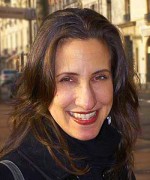Column Name
Title
Born in Ankara, Turkey, Banu Ogan grew up in Bloomington, Ind., and attended the University of North Carolina at Chapel Hill, where she earned a bachelor’s degree in biology (with a minor in chemistry). She has taught at the Merce Cunningham Studio since 1997, and has staged several of Cunningham’s works on professional companies and student groups. She joined the Juilliard faculty in 2005.
Body
Who was the teacher or mentor who most inspired you when you were growing up and what did you learn from that person?
My parents are both experienced and revered professors of journalism and accounting at Indiana University and at the University of Florida, so I have learned a great deal about teaching from them. What they have taught me about honesty, integrity, adventure, curiosity, hard work, commitment, perseverance, and not sweating the small stuff are not only great life skills, but help me lay my own foundation toward becoming the teacher I want to be.
What dance performance have you attended that changed the way you think about dance?
I was really moved by a performance of Emio Greco | PC recently. The company consists of Emio Greco and Pieter C. Scholten, working out of Amsterdam. I had never seen dance so purely based in movement, so without linear narrative, but possessing such a strong dramatic element. To me, it was the dance version of David Lynch’sMulholland Drive—engrossing, captivating, terrifying, but only for the movement/acting and for the theatrical elements, for what we perceive is the story, for what we imagine. Merce Cunningham changed my view of dance in a permanent way, and when I see artists going further with his once-radical ideas, I am very inspired.
If you could have your students visit any place in the world, where would it be, and why?
I am half Turkish, and was fortunate to have parents who made sacrifices to show me the importance of the Turkish culture; when I was a child, we visited often. I would encourage my students to travel to a place they identify with, to go somewhere, anywhere, within their financial means (find the creative, inexpensive ways to travel!), soak it up, eat the food, see the sights, talk to the people, dance their dances, hear their music, see their art, attempt their language, ride their buses and trains, read their literature, all without judgment, and filled with curiosity, openness, and eagerness.
What’s the most embarrassing moment you’ve had as a performer?
Let’s see ... When the rear zipper of my pants opened during a performance of Merce’s Rondo and I had to change all the choreography to face downstage to avoid flashing the audience. When I got a deep split in my foot during the performance of Sounddance, couldn’t exit until the end of the dance, and left trails of blood all over the stage. When I finished performing my Signals solo—strongly, confidently, the best I’d ever performed it—and in my next entrance tripped exuberantly and went down. I love attempting to find solutions when the unpredictable happens.
What are your non-dance related interests or hobbies? What would people be surprised to know about you?
I went to culinary school in 2003, thinking I might want to try my hand at a little food writing, and I still might, but for now I use the skills at home. I can lose myself in the creation of a meal, forget the day’s stresses, and make other people happy by sharing my efforts.
What is your favorite thing about New York City?
I like the feeling of community in New York, rare for a city of so many people. In a city without a profound car culture, we’re all in it together. If we have a rain deluge and umbrella-inverting wind, or a subway failure, or a blackout, or ..., or ..., we’re all in it together, all of us, with our thousands of different backgrounds, languages, experiences.
What book are you reading right now?
I have just finished The Omnivore’s Dilemma by Michael Pollan, a shocking book full of facts about the industrial food industry in this country. It helped me change the way I see myself in relationship to the types of foods I put in my own body, and the ramifications of those decisions on the environment, politics, and the global economy.
If your students could only remember one thing from your teaching, what would you want it to be? Or how has your teaching changed over the years?
I would like my students to remember me as a tough, fair, encouraging, and fun teacher. I want my students to feel that they are safe to experiment, that they are allowed to make mistakes. Merce Cunningham told a story of hearing John Cage teach a percussion class and, after listening to his students play, telling them, “O.K., it’s all perfect. Now go ahead and make a few mistakes.” When I heard this from Merce, in class, a student always trying to ‘get it right,’ I felt liberated. I felt like I could continue on the journey for precision, for clarity, but also explore risk a bit, find out what it is to go further, even if it meant messing up.





